Mastering Hotel Room Upgrades: Powerful Strategies for Hoteliers
Oct 23, 2025
 Mika Takahashi
Mika TakahashiPopular Categories
Hotel Technology & InnovationHotel Operations OptimizationDigital MarketingIndustry TrendsRevenue ManagementHospitality Industry
Popular Categories
Trending Post
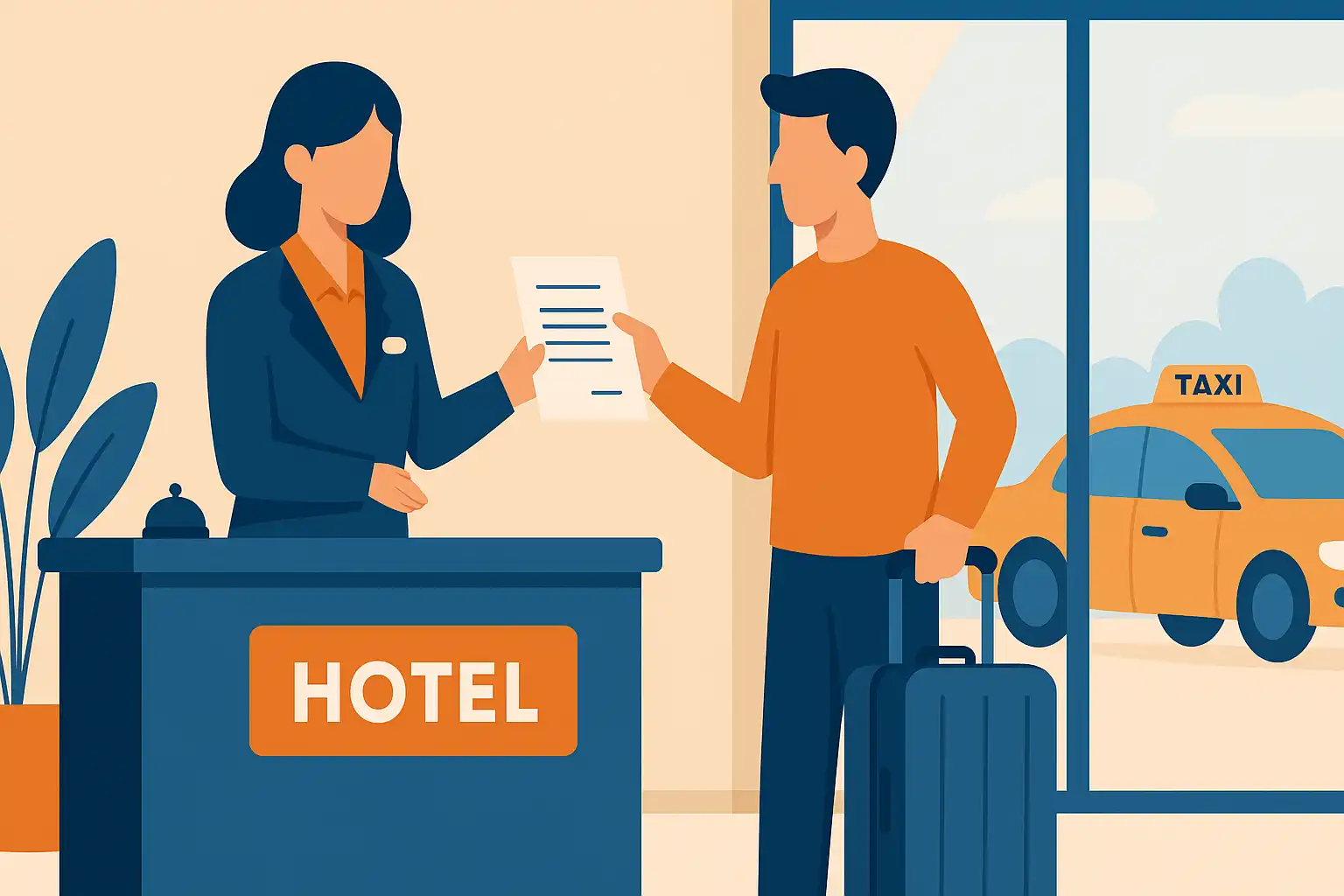
Hotel Walk Letter Template: Professional Guest Communication
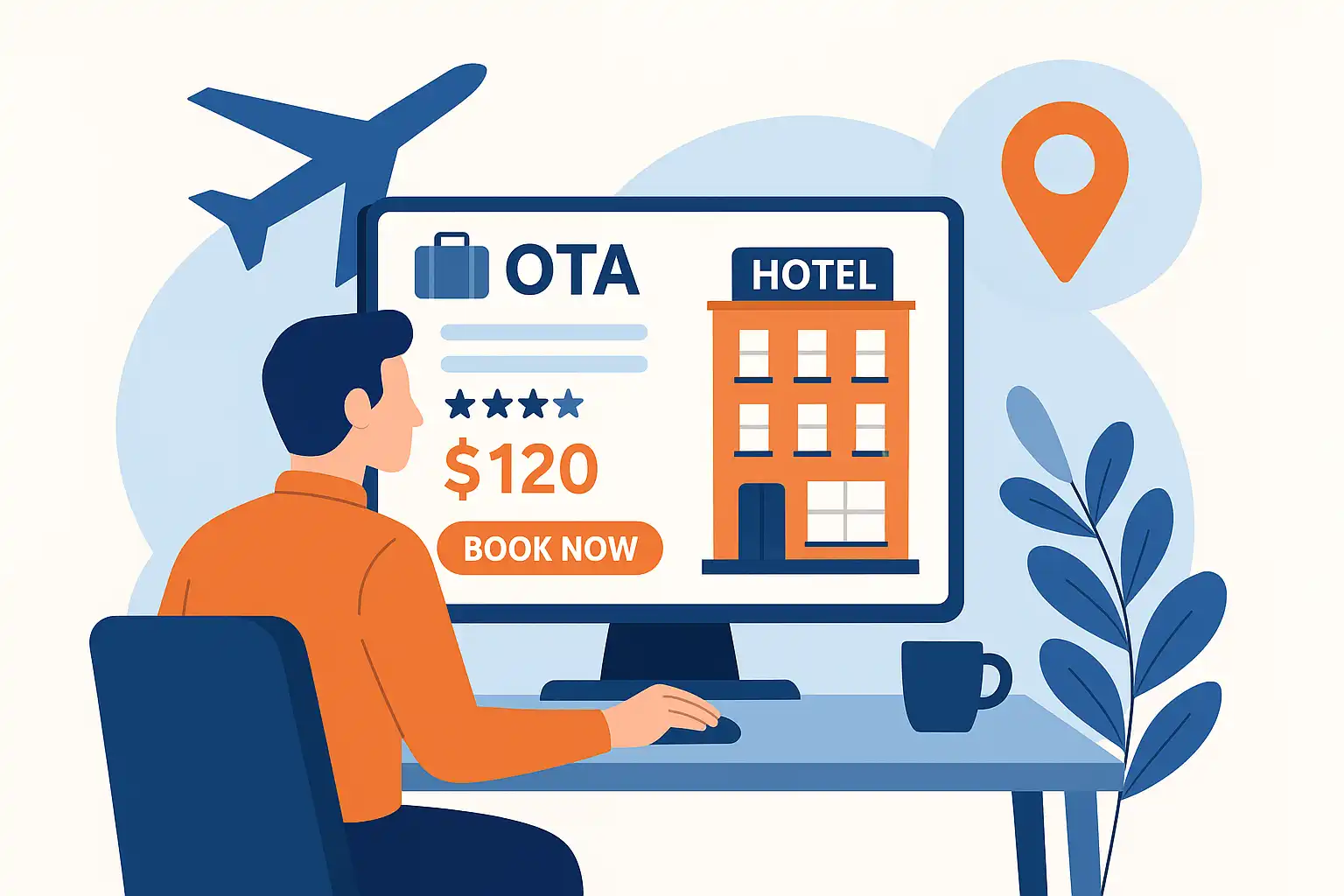
Online Travel Agents: What They Are and How They Work
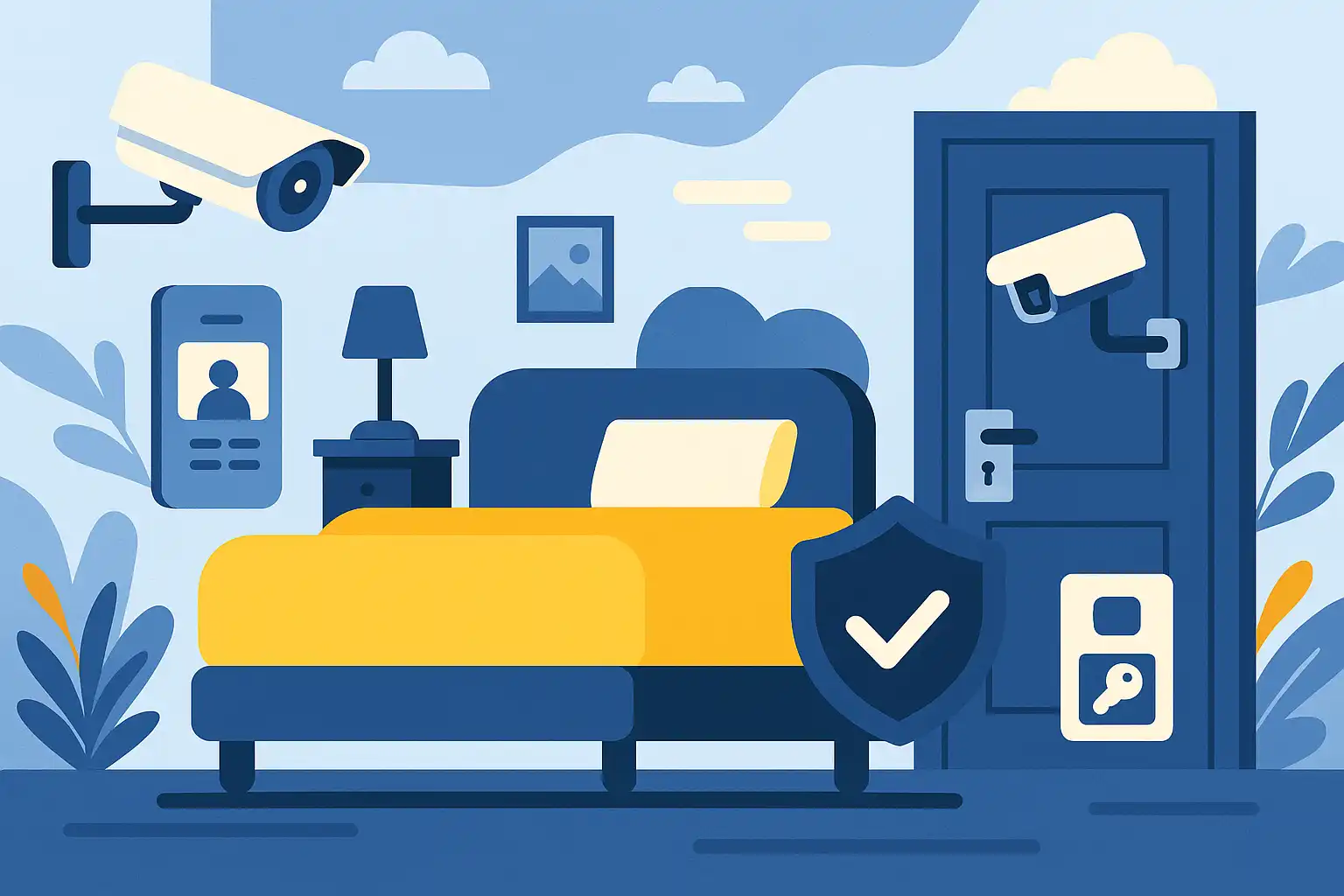
Hotel Security Systems: Modern Protection Solutions

Hotel Advertising: Complete Guide to Boost Bookings and Revenue
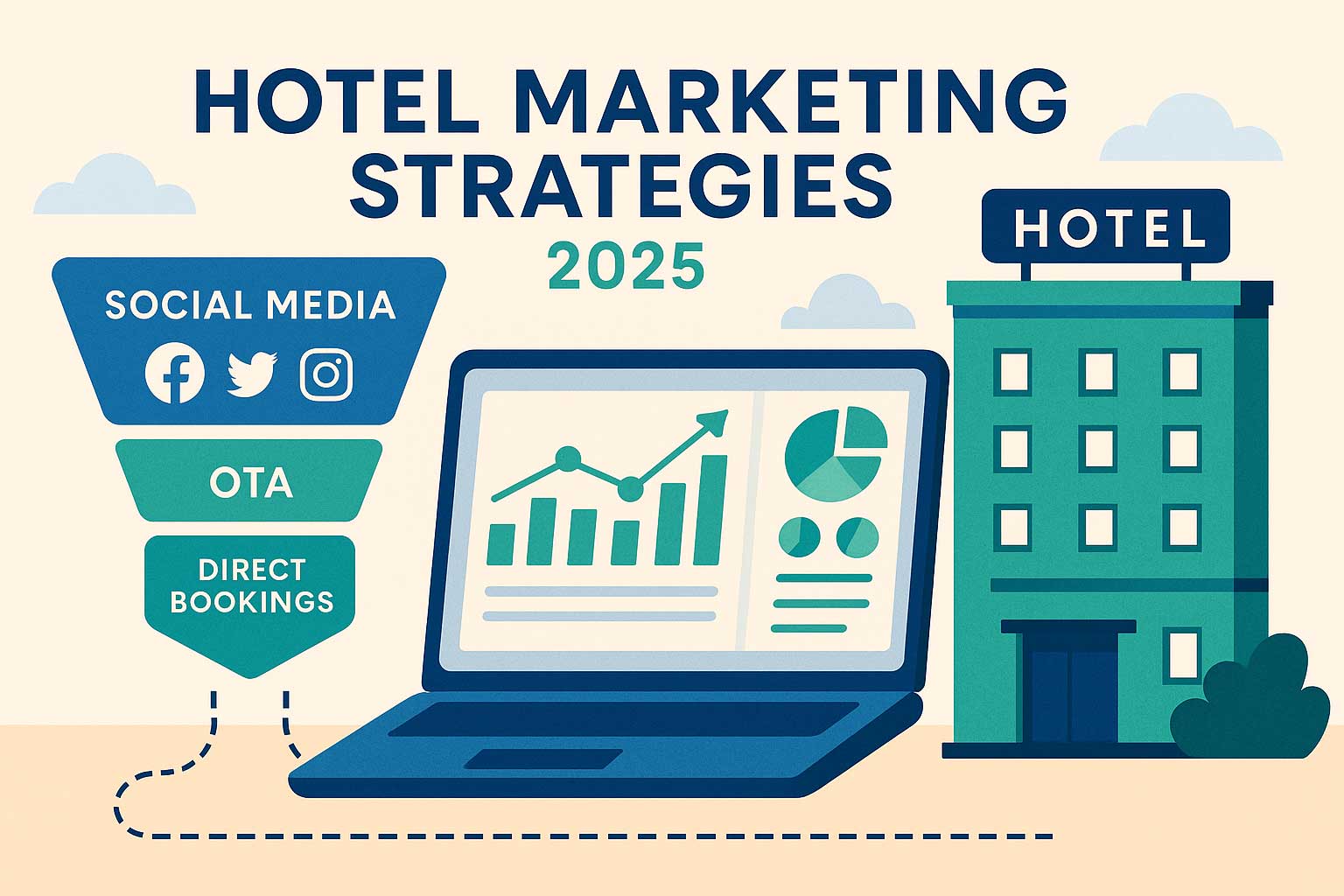
25 Hotel Marketing Strategy Ideas for 2025: Complete Guide

AI Reservation Agent: Revolutionizing Hotel Booking and Guest Experience

PMS Communication: Streamlining Property Management Through Effective Guest Messaging
Table of contents
In today’s competitive hotel world, delivering an exceptional guest experience is what keeps customers coming back instead of choosing your competitors. One of the most effective ways to make a lasting impression and build loyalty is through hotel room upgrades. When done right, these upgrades don’t just delight guests—they also boost satisfaction scores, earn glowing reviews, and help you maximize revenue without needing a huge investment.
This guide dives into how to strategically implement hotel room upgrades—from spotting the right guests to execute upgrades smoothly. Whether you want to enhance your guest experience strategy, improve loyalty program perks, or create smarter upselling opportunities, knowing when and how to offer upgrades is key to modern hotel success.
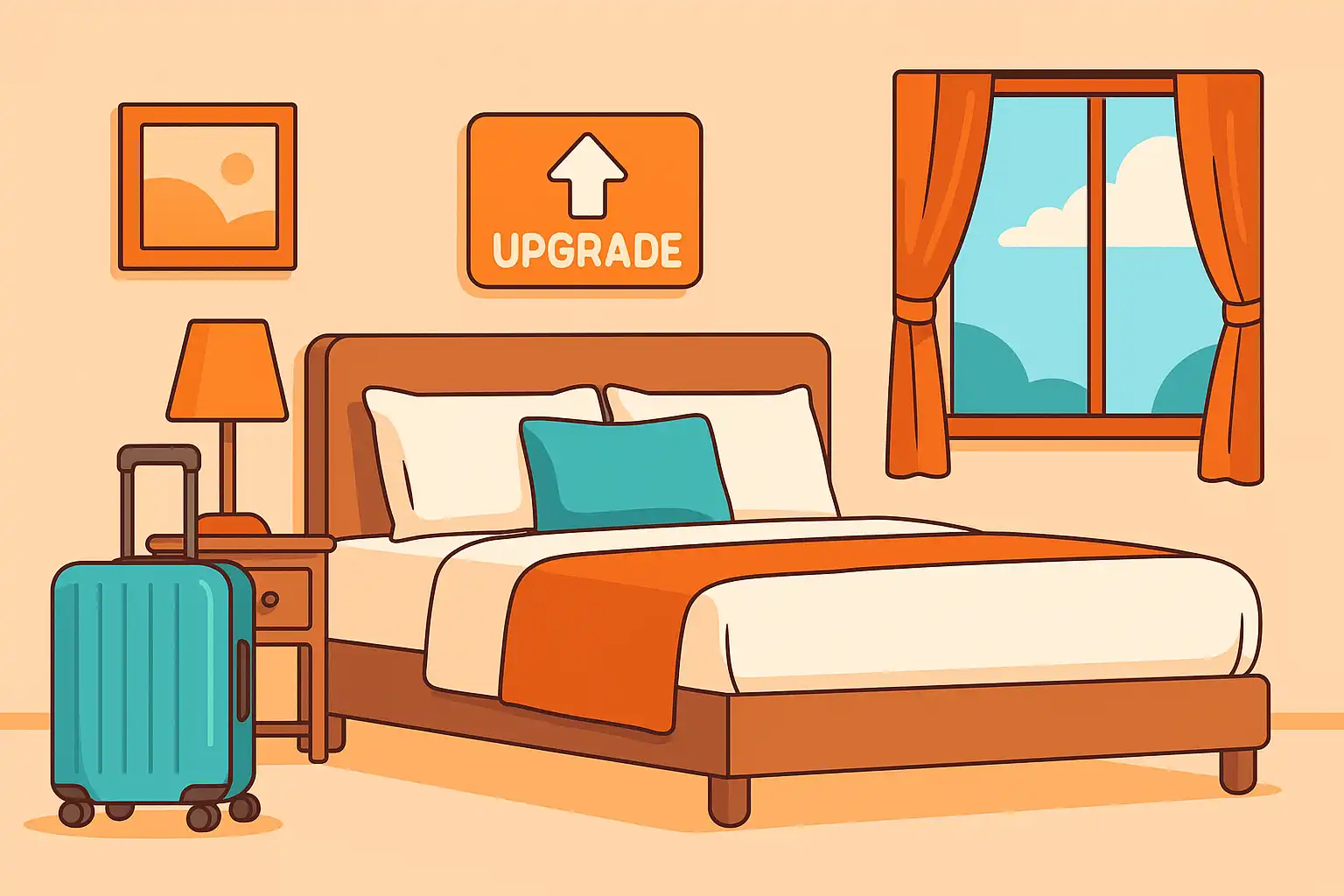
Understanding Hotel Room Upgrades vs. Upselling
A hotel room upgrade means moving guests from their originally booked room to a better room type—without charging them extra. This complimentary hotel room upgrade is a warm gesture that can turn an ordinary stay into something memorable. Upgraded rooms often come with perks like more space, better views, premium bedding, or exclusive access to hotel amenities.
On the flip side, upselling is a way to generate more revenue by encouraging guests to pay for premium rooms or extra services either before or during their stay. Through hotel upselling, you might offer larger rooms, spa services, exclusive dining experiences, or bundled packages that add value to the guest’s stay while bringing in extra income.
Understanding the difference between these two is important. Complimentary upgrades foster customer loyalty and spark positive word-of-mouth, while upselling focuses on boosting immediate incremental revenue. Industry data shows that hotels using digital upselling techniques can earn an extra $10-50 per upgraded guest, with acceptance rates three to five times higher than traditional face-to-face offers.
Smart hotels often blend both approaches—offering complimentary upgrades to loyal or high-value guests and presenting upselling opportunities to others during booking and check in.
Why Hotels Should Offer Room Upgrades
Guest satisfaction is the foundation of a thriving hotel business. Room upgrades serve several purposes beyond just making guests happy. When guests get unexpected added value through complimentary upgrades, they form stronger emotional connections with your hotel, leading to more repeat bookings and higher lifetime customer value.
Upgrades also have a huge impact on your online reputation. Guests often mention these thoughtful gestures in their positive reviews, boosting your hotel’s digital presence and attracting future bookings. This kind of organic marketing can be far more effective and affordable than traditional advertising.
From an operational angle, upgrades help you make the most of your inventory during low occupancy periods. Instead of letting premium rooms sit empty, strategic upgrades fill those spaces while keeping standard rooms available for last-minute bookings. This way, you maximize your revenue per available room (RevPAR) without lowering your average daily rate (ADR).
Upgrades are also great tools for service recovery. If something goes wrong—like a maintenance issue or room assignment problem—offering a complimentary upgrade can quickly win back guest trust and prevent negative reviews. The cost of an upgrade is usually much less than the potential revenue lost from unhappy customers.
For business travelers and corporate clients, surprise upgrades can influence future booking choices and even contract negotiations. Companies appreciate hotels that go the extra mile for their employees, which can result in more group bookings and long-term partnerships.
When to Provide Room Upgrades
Timing is everything when it comes to upgrades. Hotels should focus on offering upgrades when premium rooms are available without cutting into upselling chances. Low occupancy periods are perfect for generous upgrade policies—costs are minimal, but the boost to guest satisfaction is huge.
Special occasions like weddings, anniversaries, and birthdays are natural moments to surprise guests with upgrades. These gestures create memorable experiences that guests love sharing on social media and with friends.
Service recovery situations call for immediate upgrades to fix issues and turn a guest’s experience around. Shoulder seasons are also great times to offer upgrades, as guests tend to have lower expectations and appreciate the extra touch more.
Loyalty program members should consistently receive upgrade recognition, especially repeat guests who actively engage with your brand. Their positive mentions within their networks amplify your marketing reach.
Even hotel overbooking scenarios can be turned into opportunities. When standard rooms are oversold, upgrading early arrivals proactively helps maintain high guest satisfaction.
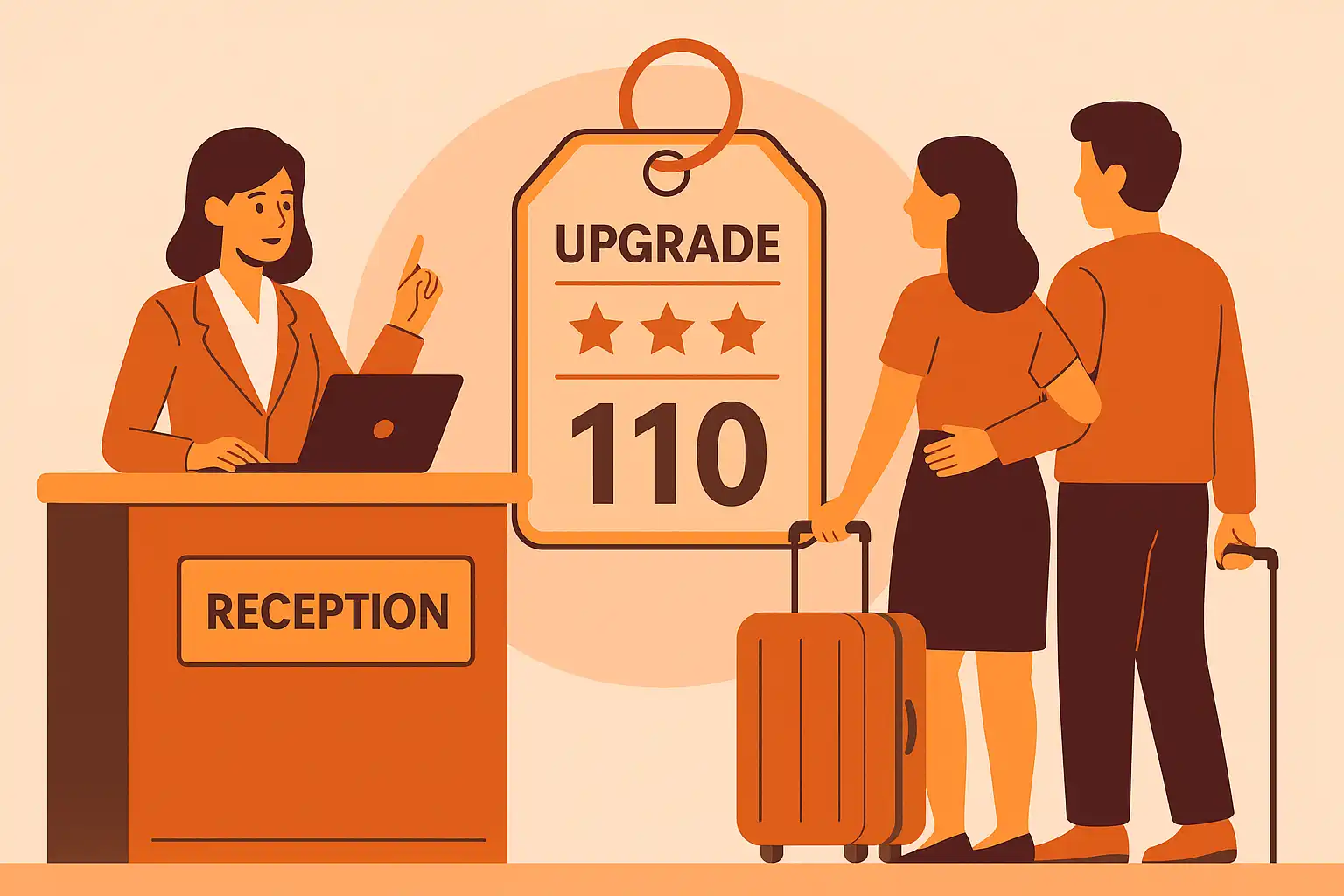
Target Guest Segments for Upgrades
Choosing the right guests for upgrades starts with understanding your audience. Loyalty program members, especially those with elite status, top the list—they expect recognition and generate substantial long-term revenue while acting as brand ambassadors.
Corporate clients and business travelers deserve special attention due to their frequent bookings and influence on future reservations. Upgrading these guests can sway corporate travel policies and encourage group bookings.
Guests celebrating special occasions are another key group. Honeymooners, anniversary couples, and milestone birthday guests often share their upgraded experiences widely, boosting your hotel’s visibility.
VIPs and influencers can create significant marketing value through their networks. Keeping updated profiles on these guests helps staff deliver personalized recognition.
Group leaders and meeting planners also impact booking volumes. Offering them upgrades can secure future group business and contract renewals.
First-time guests with high-value profiles offer a chance to make a great first impression that encourages loyalty. Returning customers who haven’t visited in a while are perfect candidates for reactivation through upgrades.
How to Implement Room Upgrade Strategies
Making upgrades work smoothly requires clear policies and staff empowerment. Define eligibility criteria based on guest type, room availability, and business goals to ensure fairness and consistency. Empower your front desk team to make upgrade decisions confidently during check in.
Integrate your upgrade strategy with your property management system to automatically flag loyalty members, special occasion guests, and repeat customers. Staff training should cover both system use and the personal touch needed to recognize guests effectively.
Keep real-time tabs on premium room inventory to avoid overpromising upgrades. Use occupancy forecasts to adjust upgrade generosity—more during slow periods and conservative during busy times.
Train front desk staff on guest recognition, how to present upgrades as personalized gestures, and managing expectations to ensure a positive experience.
Make sure housekeeping and other departments coordinate to prepare upgraded rooms to premium standards. Also, notify hotel restaurant and spa teams about upgraded guests who might want extra attention.
Operational Considerations
Monitor room availability daily and use occupancy forecasts to guide when to offer upgrades. Revenue management teams should provide input on balancing loyalty building with revenue goals.
Coordinate timing with housekeeping to ensure premium rooms are ready and meet high standards by guest arrival.
Update guest profiles in your PMS with upgrade history and feedback to personalize future stays and refine your upgrade program.
Track upgrade frequency to avoid overusing upgrades on the same guests, keeping the program sustainable.
Communicating Room Upgrades Effectively
How you present an upgrade matters. Frame it as a personalized recognition, emphasizing exclusivity and added value rather than just a bigger room. Timing is key—introduce upgrades at check in to capture guests’ excitement.
Use language that highlights specific benefits like access to spa services, late check out, or exclusive dining options instead of vague terms like “better room.”
Explain the features of the upgraded room so guests understand what makes it special.
Follow up during the stay to ensure guests are enjoying their upgrade and address any concerns promptly.
Document guest reactions to improve your communication approach over time.
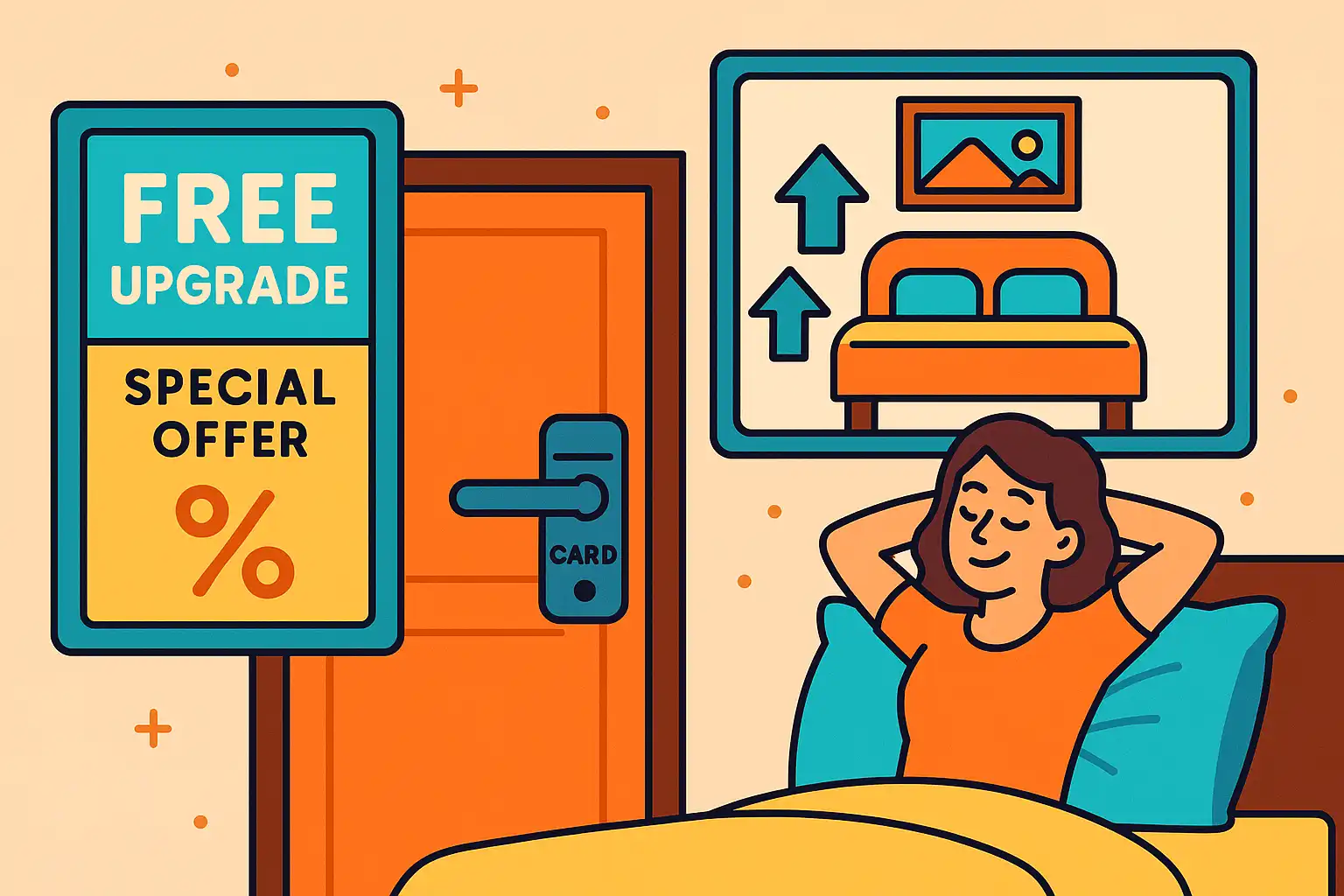
Scripts and Communication Examples
For loyalty members: “Mr. Johnson, as a valued Gold member, we’re delighted to offer you a complimentary room upgrade to our Executive Suite, which includes access to our club lounge with free breakfast and evening cocktails, plus a late check out until 2 PM.”
For special occasions: “Congratulations on your anniversary! We’d love to enhance your celebration by upgrading you to our Romance Suite, featuring a private balcony with city views and complimentary spa packages for two.”
For service recovery: “We sincerely apologize for the inconvenience with your original room assignment. To make this right, we’re moving you to our premium corner suite with panoramic views and providing dining credits for our award-winning hotel restaurant.”
Pay attention to guest feedback so your team can tailor future upgrade offers.
Strategic Upselling Opportunities
While complimentary room upgrades build loyalty, smart upselling drives immediate extra revenue. The best time to offer upsells is throughout the guest journey—from booking to post-arrival.
Pre-arrival emails are great for presenting upgrade options when guests are excited about their trip. These messages can showcase premium room features, extra amenities, and package deals that add value to the guest’s stay while generating more revenue before arrival.
During the booking process, your booking engine can display upgrade options with clear visuals and benefits. Many guests prefer to decide early rather than feel pressured at check in.
Mobile check-in apps offer seamless upselling without front desk interaction. Digital upselling acceptance rates are three to five times higher than face-to-face offers, especially among business travelers and tech-savvy guests.
Package deals that combine hotel room upgrades with spa services, dining credits, or local experiences create compelling value that guests are more likely to accept.
Train your staff in consultative selling to understand guest preferences and tailor upsell offers accordingly. Knowing why guests travel and what they value helps you boost revenue effectively.
Upselling vs. Upgrading Decision Matrix
Revenue management should guide when to offer complimentary upgrades versus paid upsells. During busy periods, prioritize upselling to maximize revenue; during low occupancy, focus on complimentary upgrades to build loyalty.
Analyze guest profiles to choose the right approach. Price-sensitive travelers might prefer free upgrades, while luxury seekers may respond better to premium packages with added services.
Use occupancy forecasts to adjust policies—be more conservative during peak times and generous during slow seasons. Historical spending data can also identify guests likely to buy upgrades.
Technology and Systems Integration
Modern property management systems make managing upgrades easier by automatically identifying eligible guests and tracking room availability.
Guest recognition software helps staff spot VIPs and access relevant guest history for personalized service. Integrating with your CRM ensures comprehensive profiles that improve upgrade decisions.
Revenue management tools analyze demand and pricing to optimize when to offer upgrades or upsells, balancing guest satisfaction and revenue.
Mobile apps and digital check-in platforms let guests choose upgrades themselves, increasing convenience and revenue.
Analytics track upgrade program success—measuring guest satisfaction, revenue impact, and loyalty gains—so you can continuously improve your strategy.
CRM integration captures guest preferences and feedback to personalize future stays and refine upgrade offers.
Measuring Success and ROI
Tracking upgrade programs is essential to ensure they deliver value. Guest satisfaction scores typically rise with upgrades, and online reviews often highlight these experiences.
Repeat booking rates among upgraded guests show the long-term loyalty impact of your program.
Analyze both direct costs and opportunity costs—while complimentary upgrades reduce immediate revenue, they often pay off through increased loyalty and repeat business.
Monitor social media for organic marketing generated by guests sharing their upgrade experiences.
Cost-benefit analysis should factor in service recovery value, as upgrades often prevent damaging reviews and lost customers.
Calculate ROI considering both financial metrics and qualitative benefits like brand reputation and competitive edge.
Collect guest feedback post-stay to identify strengths and areas for improvement.
Hotels with strong upgrade programs often see 15-20% increases in positive reviews. Combining complimentary upgrades with targeted upselling creates a powerful way to enhance guest experience and boost revenue.
Strategic hotel room upgrades are more than just nice gestures—they’re key tools for building loyalty, generating positive buzz, and standing out in a crowded market. The secret is balancing generosity with smart business practices to ensure long-term success.
Making upgrades part of your daily operations—from front desk training to tech integration—helps your property outperform competitors in guest satisfaction and financial results. Investing in upgrade strategies pays off through repeat bookings, better online reputation, and stronger customer relationships that drive sustainable growth.
